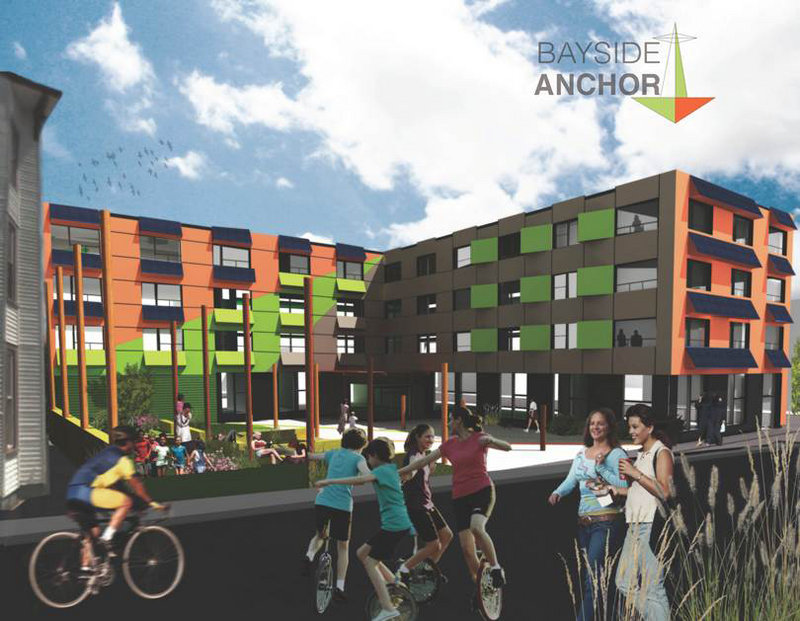With what Portland has to offer — its vital downtown, vibrant arts scene, growing economy and seaside setting — it’s not surprising that people from many different places and walks of life come to live here.
But the popularity of the city has its downside: It’s harder than ever for low-income and moderate-income residents to find a place where they can afford to live.
While median income in Maine has remained relatively stagnant, rents have climbed. Particularly hard hit are the working poor, whose monthly rent and utility costs eat up an outsize share of their income but who earn too much to qualify for rent subsidies.
So it’s good news that a team led by the Portland Housing Authority is proposing to build 42 new mixed-income housing units in East Bayside. Bayside Anchor’s innovative cost-cutting strategies — using prefabricated components and providing no off-street parking — have already secured it a $250,000 loan to cover some design and planning costs.
But this vision won’t become reality without action by state and city officials. To continue to grow, Maine’s biggest city and its economic engine must be affordable for a wide range of residents. Bayside Anchor takes a pioneering approach to this goal, but it needs, first, for the state to approve tax credits, and then for the Portland Planning Board to be willing to reconsider building requirements.
This project would provide 10 units at market rates; the rest are targeted for households earning $18,000 to $45,000 a year. Structuring Bayside Anchor as a mixed-income development is both the right and the smart thing to do. Residents of mixed-income housing are less likely than those in low-income housing to become stigmatized or isolated. And a mixed-income project is more likely to attract the additional development needed to keep a neighborhood healthy.
Bayside Anchor also recognizes the need for affordable housing among the working poor, many of whom work in the fast-growing service fields. Hotels and restaurants in town are booming, for example, and they’re hiring wait staff, receptionists, cashiers, cleaners, line cooks and other support staff. But these jobs pay about $12 an hour or less. This wage doesn’t go very far toward housing in a city where the average two-bedroom apartment rents for about $1,000 a month.
Units at Bayside Anchor, on the other hand, would be well within reach, starting at $535 a month for an efficiency apartment. And the 32 affordable-housing units in the development would accommodate households earning a diverse range of incomes, up to 60 percent of the area’s median.
That the project offers no off-street parking is likely to stir a great deal of controversy, but it shouldn’t. Though current requirements call for one space per housing unit, the Portland Planning Board is allowed to — and in this case should — waive the mandate. Parking spaces are of relatively little benefit to low-income tenants. They’re less likely to own cars, and access to Portland’s transit system makes owning a vehicle less necessary.
And the drawbacks to mandated parking are obvious: Parking spaces take up land that could be used for housing. Having to provide them also drives up development costs, discouraging construction of affordable housing and thus driving up local rents.
City and state officials both have a key role to play here. If the state doesn’t tap Bayside Anchor to receive low-income housing tax credits, the project would have to be abandoned — at a high cost to everyone who wants a healthy Portland.
Indeed, considering the relatively small size of Bayside Anchor, it could have a large impact on the fabric of the city. Should Bayside Anchor be funded and come before the Planning Board, the city could take the time during the review of the development to weigh what would happen if it revised the parking mandate. The process could result in a shift in land-use and transportation policy.
The parking requirement makes it more difficult for developers to build here and for residents to find affordable homes. Diversity — of races, incomes, occupations — is what makes Portland such a great place to live; unless we want a monolithic city instead of the vital mix that we’re used to, we need to take down barriers to constructing affordable housing.
Copy the Story Link
Send questions/comments to the editors.



Success. Please wait for the page to reload. If the page does not reload within 5 seconds, please refresh the page.
Enter your email and password to access comments.
Hi, to comment on stories you must . This profile is in addition to your subscription and website login.
Already have a commenting profile? .
Invalid username/password.
Please check your email to confirm and complete your registration.
Only subscribers are eligible to post comments. Please subscribe or login first for digital access. Here’s why.
Use the form below to reset your password. When you've submitted your account email, we will send an email with a reset code.